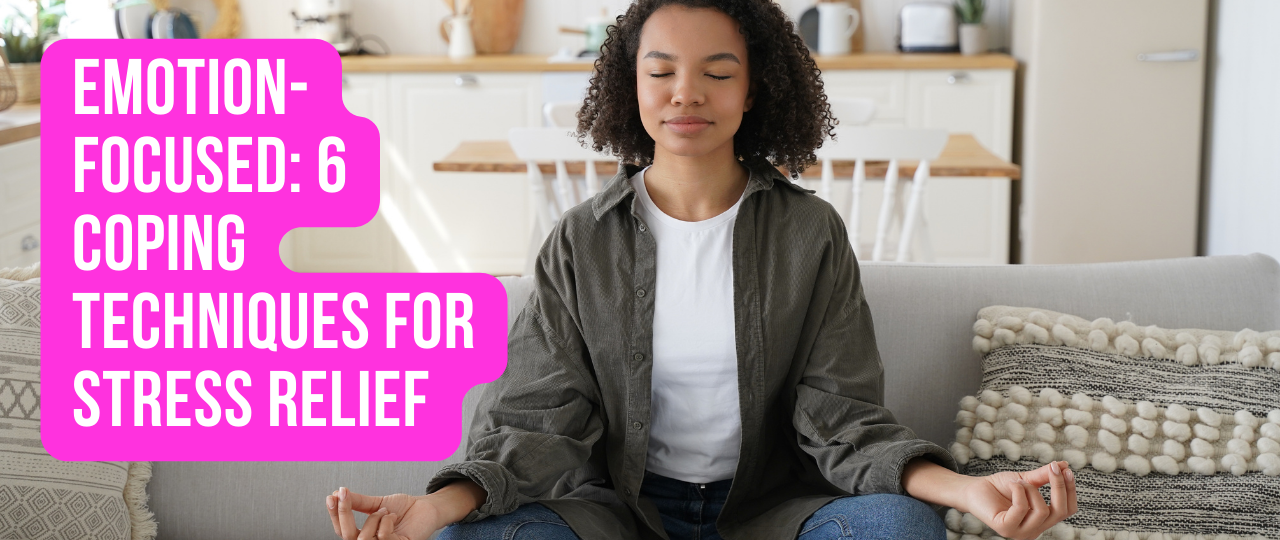Definition: Stress management techniques can fall into two categories: problem-focused coping and emotion-focused coping. Basically speaking, problem-focused coping strategies aim to eliminate sources of stress or work with the stressors themselves, while emotion-focused coping techniques enable aid you in becoming less emotionally reactive to the stressors you face, or altering the way you experience these situations so they impact you differently.
Many people think mainly of solution-focused coping strategies as the best way to manage stress, as cutting out the things that seem to cause us stress means we don't need to learn how to alter our responses to any stressors--there will be none left in our lives! However, it's not entirely possible to cut all stress out of our lives--some factors in our jobs, our relationships, or our lifestyles are simply prone to creating challenges. In fact, it wouldn't be entirely healthy to eliminate all stressors even if we could; a certain amount of stress is considered to be healthy. (Read more on eustress, the 'healthy' type of stress.)
This is part of why emotion-focused coping can be quite valuable--shifting how we experience potential stressors in our lives can reduce their negative impact. With emotion-focused coping, we don't need to wait for our lives to change, or work on changing the inevitable--we can simply find ways to accept what we face right now, and not let it bother us. This can cut down on chronic stress, as it gives the body a chance to recover from what might otherwise be too-high levels of stress.
Another advantage to emotion-focused coping is that it allows us to think more clearly and access solutions that may not be available if we are feeling overwhelmed. Because stressed people do not always make the most effective decisions, emotion-focused coping can be a strategy to get into a better frame of mind before working on problem-focused techniques. In this way, emotion-focused coping can help with both emotions and solutions. And the two types of coping strategies work well together in this way.
While problem-focused strategies need to fit well with the specific stressors they are addressing, emotion-focused coping techniques work well with most stressors, and need only fit the individual needs of the person using them. Finding the right emotion-focused coping strategies for your lifestyle and personality can provide you with a vital tool for overall stress relief and can enable you to achieve greater physical and emotional health. The following techniques work well for stress of all types:
Meditation
Meditation can help you to separate yourself from your thoughts as you react to stress, so you can stand back and choose a response rather than reacting out of panic or fear. Meditation also allows you to relax your body, which can reverse your stress response as well. Those who practice meditation in an ongoing way tend to be less reactive to stress, too, so meditation is well worth the effort it takes to practice.
Journaling
Journaling allows you to manage emotions in several ways. It can provide an emotional outlet for stressful feelings; it can enable you to brainstorm solutions to problems you face; it can help you to cultivate more positive feelings, which can help you to feel less stressed. Journaling also brings other benefits for wellness and stress management, making it a great emotion-focused coping technique.
Reframing
Cognitive reframing allows you to shift the way you see a problem, which can actually make the difference between whether or not you feel stressed by facing it. Reframing techniques aren't about 'tricking yourself out of being stressed,' or pretending your stressors don't exist; reframing is more about seeing solutions, benefits, and new perspectives.
Cognitive Distortions
Recognizing the way the mind might naturally alter what we see, what we tell ourselves about what we are experiencing, and the ways in which we may unknowingly contribute to our own problems, can allow us to change these patterns. Become aware of common cognitive distortions, and you'll be able to catch yourself when you do this, and will be able to recognize and understand when others may be doing it as well.
Positive Thinking
Being an optimist involves specific ways of perceiving problems--ways that maximize your power in a situation, and keep you in touch with your options. Both of these things can reduce your experience of stress, and help you to feel empowered in situations that might otherwise overwhelm you.
Stress Management Articles
For ongoing information and support in stress management, check out Salty Vixen's Mind, Body & Soul section. It's a great way to work toward building stress relief into your lifestyle without feeling overwhelmed by too much change at once. This allows you to relieve stress in a low-stress way.
Also Known As: emotion-based coping




















